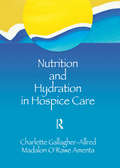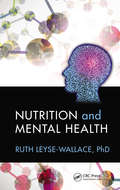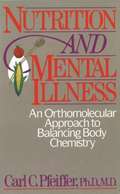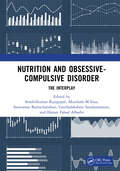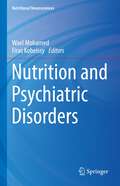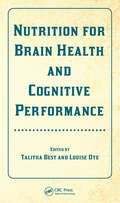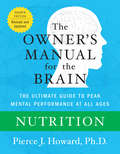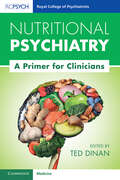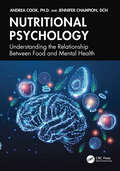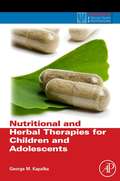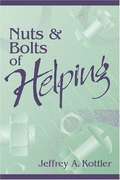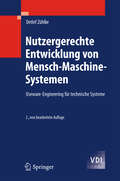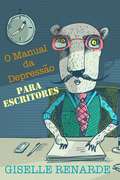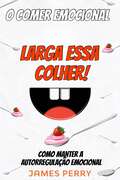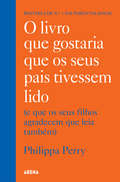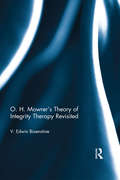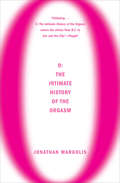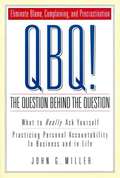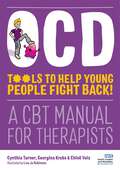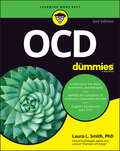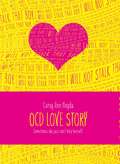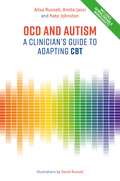- Table View
- List View
Nutrition and Hydration in Hospice Care: Needs, Strategies, Ethics (The\hospice Journal #Vol. 9, Nos. 2/3)
by Charlette Gallagher-Allred Madalon O'Rawe AmentaThis scholarly book enables health care professionals to appropriately address hospice patients’and families’concerns about nutrition and hydration. Nutrition and Hydration in Hospice Care is a comprehensive resource that provides hands-on practical information that readers can use in everyday hospice practice. The chapters identify problems, solutions, and ethical issues of nutrition and hydration in hospice care.The contributing authors provide the way for health care professionals, especially those in nursing, dietary, and pharmacy units, to jointly and effectively manage troublesome symptoms and ethical issues. The following topics are included in the scope of coverage: nutrition/hydration needs during end-stage disease nursing and dietary roles in identifying nutrition/hydration problems and implementing treatment how needs of dying children and adults are different legal and ethical dilemmas of withholding or withdrawing nutrition and hydration appropriate and inappropriate uses of enteral and parenteral nutrition support during end-stage diseases food service considerations in inpatient hospice facilities appetite stimulant use in palliative careBecause Nutrition and Hydration in Hospice Care is comprehensive, all members of hospice staffs can find practical information to use each day. The authors cover issues not found in other books for nurses, dietitians, pharmacists, and physicians. They will find the information ready to apply at their work settings.
Nutrition and Mental Health
by Ruth Leyse-WallaceAn examination of the role nutrients play in mental health, this book reviews the scientific literature from many fields of science: health, psychology, nutrition, mental well-being, and the interface with chronic disease. The book provides a straightforward, readable report of broadly selected scientific research on how various nutrients affect mental health. It covers several types of mental health disorders and their links to nutrients, nutritional status, and nutritional supplements. This book provides mental health professionals with the information they need to evaluate nutritional issues.
Nutrition and Mental Illness: An Orthomollecular Approach to Balancing Body Chemistry
by Carl C. PfeifferNutritional therapy for mental illness. Explains the role played by vitamins and trace elements in mental health.
Nutrition and Obsessive-Compulsive Disorder: The Interplay
by Senthilkumar Rajagopal Saravanan Ramachandran Geethalakshmi Sundararaman Hanan Fahad Alharbi Musthafa M EssaKey features – Covers emerging therapeutic and nutritional approaches for the treatment and management of OCD Reviews the role of various micro-nutrients in OCD Discusses the prenatal genetic diagnosis and application of computational modelling in OCD Includes the nutritional and dietary roles in neuropsychiatric disorders like depression and obsessive-compulsive disorder (OCD) Explores the application of nano-biotechnology in OCD
Nutrition and Psychiatric Disorders (Nutritional Neurosciences)
by Firas Kobeissy Wael MohamedThe book comprehensively reviews the role of nutrition in psychiatric disorders. It provides mechanistic insights into the effects of nutrition on metabolic pathways, mitochondrial nutrients, neurodegeneration and CNS disorders, cell signaling, and neuronal functions. The book further highlights the role of diet in preventing and treating mental health and modifying drug treatment effects. Further, it explores the relationship between nutrition and psychiatric disorders, including depression, autism, anxiety, Attention-Deficit / Hyperactivity Disorder, and OCD. The book further explores the recent advancements in understanding the important role of nutrients as therapeutics in various psychiatric disorders. Lastly, it presents an overview of nutrients as neuroprotective agents along with the main principles of nutrigenomics. The book is essential reading for neuroscientists interested interest in food therapeutic strategies.
Nutrition for Brain Health and Cognitive Performance
by Talitha Best Louise DyePublic awareness of the role diet plays in brain function has been steadily increasing. This has led to significant development of new products, dietary supplements, functional foods, nutraceuticals and public health recommendations for maintaining brain function. Nutrition for Brain Health and Cognitive Performance presents a detailed and innovati
Nutrition: The Owner's Manual
by Pierce HowardCutting-edge, user-friendly, and comprehensive: the revolutionary guide to the brain, now fully revised and updatedAt birth each of us is given the most powerful and complex tool of all time: the human brain. And yet, as we well know, it doesn't come with an owner's manual--until now. In this unsurpassed resource, Dr. Pierce J. Howard and his team distill the very latest research and clearly explain the practical, real-world applications to our daily lives. Drawing from the frontiers of psychology, neurobiology, and cognitive science, yet organized and written for maximum usability, The Owner's Manual for the Brain, Fourth Edition, is your comprehensive guide to optimum mental performance and well-being. It should be on every thinking person's bookshelf. What are the ingredients of happiness? Which are the best remedies for headaches and migraines? How can we master creativity, focus, decision making, and willpower? What are the best brain foods? How is it possible to boost memory and intelligence? What is the secret to getting a good night's sleep? How can you positively manage depression, anxiety, addiction, and other disorders? What is the impact of nutrition, stress, and exercise on the brain? Is personality hard-wired or fluid? What are the best strategies when recovering from trauma and loss? How do moods and emotions interact? What is the ideal learning environment for children? How do love, humor, music, friendship, and nature contribute to well-being? Are there ways of reducing negative traits such as aggression, short-temperedness, or irritability? What is the recommended treatment for concussions? Can you delay or prevent Alzheimer's and dementia? What are the most important ingredients to a successful marriage and family? What do the world's most effective managers know about leadership, motivation, and persuasion? Plus 1,000s more topics!
Nutritional Psychiatry: A Primer for Clinicians
by Ted DinanThere is increasing evidence that mental health problems such as schizophrenia, depression and anxiety are linked with poor nutrition. At present, very few psychiatrists provide nutritional advice for their patients, despite such advice complimenting drug and psychological therapies. This edited volume is the first book to provide a comprehensive overview of the relationship between nutrition and mental health, for mental health professionals. Featuring contributions from leading authorities in the field, the book examines the link between diet and the microbiome-gut brain axis and how this correlates with a variety of psychiatric disorders. The book explores how enhancing the beneficial bacteria in the gut, through the use of psychobiotics, prebiotics or dietary change can improve mood and reduce anxiety. The book will appeal to psychiatrists and psychologists, behavioural scientists, neuroscientists and nutritionists.
Nutritional Psychology: Understanding the Relationship Between Food and Mental Health
by Andrea Cook Jennifer ChampionNutritional Psychology: Understanding the Relationship Between Food and Mental Health provides a broad look at the intersection between food and mental health and offers a comprehensive approach to effectively prioritize nutrition as a powerful component to maintaining overall wellbeing. Each of the 16 chapters deeply informs about a broad range of nutritional factors including those that promote stable blood sugar levels, optimize brain functioning, and contribute to the microbiome and hormone levels so important to the brain-gut connection. There are useful insights into the dynamics of food selection, eating disorders, obesity, body image, and nutrition quality that can stabilize or destabilize mental and emotional disorders. Additionally, environmental influences that shape eating behaviors are fully explored.Nutritional Psychology: Understanding the Relationship Between Food and Mental Health combines psychology, nutrition, and medicine to form a framework for optimizing the relationship between diet and mental wellbeing. This textbook is designed for undergraduate and graduate psychology and nutrition college courses for students pursuing careers as psychologists, dietitians, nurses, social workers, and a variety of health professionals who want to incorporate nutrition and eating behavior into their discussions with patients.Dr. Cook and Dr. Champion are both clinicians who work directly with clients with psychological and physical health issues and utilize a blend of nutritional and psychological interventions in their work, providing useful clinical applications for nutritional psychology.
Nutritional Strategies for the Very Low Birthweight Infant
by David H. AdamkinThe goal of nutritional management in VLBW and ELBW infants is the achievement of postnatal growth at a rate that approximates the intrauterine growth of a normal fetus at the same postconceptional age. In reality, however, growth lags considerably after birth; although non-nutritional factors are involved, nutrient deficiencies are critical in explaining delayed growth. This practical clinically-oriented pocketbook reviews and summarises all available clinical evidence. It enables the reader to implement parenteral or enteral feeding plans, with the goals of reducing postnatal weight loss, earlier return to birthweight, and improved catch-up growth. Both nutrient balance and growth and the impact on neurodevelopment and health outcomes are evaluated. With many tables and algorithms to summarise key data and management strategies, Nutritional Strategies for the Very Low Birthweight Infant is an invaluable guide for all healthcare professionals caring for premature babies.
Nutritional and Herbal Therapies for Children and Adolescents: A Handbook for Mental Health Clinicians
by George M. KapalkaThis volume assists practicing mental health professionals in expanding their knowledge about nutritional and herbal interventions that can be attempted as alternatives to prescription medications. Designed to provide guidance for non-medical caregivers treating children and adolescents who present with emotional and/or behavioral difficulties such as such as depression, anxiety, ADHD, sleep difficulties, impulsivity, distractibility, and other psychological and psychiatric disorders, the volume provides a comprehensive discussion of naturopathic solutions based on existing research.
Nuts and Bolts for the Social Sciences
by Jon ElsterThis 1989 book is intended as an introductory survey of the philosophy of the social sciences. It is essentially a work of exposition which offers a toolbox of mechanisms - nuts and bolts, cogs and wheels - that can be used to explain complex social phenomena. Within a brief compass, Jon Elster covers a vast range of topics. His point of departure is the conflict we all face between our desires and our opportunities. How can rational choice theory help us understand our motivation and behaviour? More significantly, what happens when the theory breaks down but we still cleave to a belief in the power of the rational? Elster describes the fascinating range of forms of irrationality - wishful thinking, the phenomenon of sour grapes, discounting the future in noncooperative behaviour. This is a remarkably lucid and comprehensive introduction to the social sciences for students of political science, philosophy, sociology and economics.
Nuts and Bolts of Helping
by Jeffrey A. KottlerThis book is intended to give students in various professions a basic overview of the theory, process, and skills of helping methods.
Nutzergerechte Entwicklung von Mensch-Maschine-Systemen
by Detlef ZühlkeDas Buch gibt Entwicklern einen Leitfaden zur nutzergerechten Gestaltung von Mensch-Maschine-Systemen an die Hand. Dabei werden die besonderen Gestaltungsprobleme von Useware-Systemen für internationale Märkte ebenso behandelt wie die Auswahl von Entwicklungstools, Normen und Richtlinien sowie grundlegende Gestaltungsregeln. Wichtige Neuerungen, etwa die modellbasierte Entwicklung von Benutzungsschnittstellen oder zukünftige Interaktionsformen, werden in der Neuauflage anhand von Gestaltungsbeispielen vorgestellt.
O Manual da Depressão para Escritores
by Giselle Renarde Aline Gomes MoreiraSe você é um(a) escritor(a) vivendo com depressão, pode ser que você não saiba para onde se virar. Há dias em que a depressão devora as suas palavras e você se encontra incapaz de trabalhar. As pessoas dizem que você não está só. Então por que parece que você está? O Manual da Depressão para Escritores inclui atividades específicas para lhe ajudar a atravessar os dias de escuridão e ideias praticar para lhe ajudar a seguir em frente com os seus negócios na escrita mesmo quando você acha impossível escrever.
O comer emocional - Larga essa colher!: Como manter a autorregulação emocional
by James PerryJames Perry, traz em seu livro, algo mais amplo do que a necessidade de se alimentar bem e de uma reedução alimentar com sugestões ricas para você. Ele nos ensina neste livro que você pode mudar a sua alimentação, o seu cardápio, porém, se você não olhar para o que as suas emoções sinalizam para todo o seu organismo, você pode não ter sucesso nas novas dietas. O comer emocional é isto: rever as suas estruturas mentais e o que elas têm sinalizado para a sua saúde e mudá-las, de forma positiva, para que a sua alimentação também possa ser completamente saudável. Por que você desenvolve bulimia? Por que você desenvolve compulsão alimentar? São heranças de uma vida emocional.
O livro que gostaria que os seus pais tivessem lido: (E que os seus filhos agradecem que leia também)
by Philippa PerryBest-seller N.º 1 de parentalidade Mais de 200 000 exemplares vendidos em Inglaterra «Extremamente caloroso, inteligente, esperançoso e alentador.» Alain de Botton Todos os pais querem que os seus filhos sejam felizes. Todos os pais querem evitar fazer um mau trabalho com os seus filhos. Mas como é que se consegue isso? Nesta obra absorvente, inteligente e divertida, a reconhecida psicoterapeuta britânica Philippa Perry explica o que é realmente importante e que tipo de comportamentos devemos evitar ou fomentar no relacionamento com os nossos filhos. Em vez de desenhar o plano "perfeito", Perry oferece-nos uma visão geral de como pais e filhos podem alcançar um bom relacionamento. Com um olhar refrescante sobre a parentalidade e sem fazer julgamentos, este livro ajuda-nos a: o Entender como a nossa educação pode afectar a forma como exercemos a parentalidade. o Aceitar que cometemos erros e aprender o que podemos fazer a esse respeito. o Romper ciclos e padrões negativos. o Gerir os nossos próprios sentimentos e os dos nossos filhos. o Entender o que diferentes comportamentos transmitem. Cheio de conselhos sábios e saudáveis, este é o livro que todos os pais quererão ler e que todos os filhos agradecerão que os seus pais leiam também. Os elogios da crítica: «Todos os pais e mães devem ler este livro, por mais velho que o filho seja. Na verdade, qualquer adulto num relacionamento também deve lê-lo. Um mapa para relacionamentos saudáveis. Leitura obrigatória.» Express «Um livro amável e tolerante que advoga comportamentos amáveis e tolerantes para pais e filhos.» The Times «É como uma carta de um amigo sábio que pesquisa sobre o tema durante anos.» The Guardian «Um olhar abrangente sobre o que pode significar ser um pai saudável e emocionalmente inteligente; extremamente caloroso, inteligente, esperançoso e alentador. Mostra como, com um pouco de autorreflexão e discernimento, todos podemos aprender a poupar a próxima geração a alguns dos nossos próprios problemas.» Alain de Botton «Não tem filhos? Não importa, pois o mais recente livro da maravilhosa psicoterapeuta Philippa Perry trata realmente sobre como usar o nosso passado para nos compreendermos. (...) Também é um excelente livro para lembrar a si mesmo: a vida é difícil e você está a fazer o seu melhor - tente não se massacrar com os erros do dia-a-dia.» Stylist «Não tenho filhos, mas este livro é uma leitura fascinante sobre a bagagem emocional que todos carregamos.» Podcast How to Fail «Tão claro e verdadeiro# Útil para todos os relacionamentos da vida, não apenas para pais e filhos.» Nigella Lawson
O. H. Mowrer's Theory of Integrity Therapy Revisited
by V. Edwin BixenstineIn the mid 20th century, O. Hobart Mowrer was a celebrated academic psychologist, owing largely to his experiments with animals and humans that led to breakthrough theories on how we learn. His numerous publications in this arena propelled him to the post of President of the American Psychological Association in 1954. His own battles with depression led him to develop a new theory of psychotherapy, which he called Integrity Therapy. The premise of this modality is that the client’s deception with people they care about is the source of conscience pangs, but the client resists or represses the prompting of the conscience and this causes his or her psychological symptoms. Treatment, therefore, consists of urging the client to acknowledge his or her hidden behaviors to themselves and to significant others that they might both gain restored community with intimates and the fruits of personal integrity and inner peace ( to come clean about their deceptions and rewarding the confession with approval.) This book explores the conceptual underpinnings of Integrity Therapy and Mowrer’s unique treatment approach, detailing his methods for setting conditions for therapy, assessing clinical data, rules of engagement for transference and countertransference, and handling client resistance. Case examples and transcripts are included to demonstrate key points of this technique. Mental health professionals interested in Mowrer’s ideas or the history of psychotherapy will find this book to be a valuable and interesting resource.
O: The Intimate History Of The Orgasm
by Jonathan Margolis“Margolis devotes himself to the social history of the ways and means of orgasm . . . And his breezy, sophisticated writing doesn’t hurt, either” (Booklist). Orgasm is one of society’s most compelling, shaping forces—and most of us probably think that we are living in its golden age. But are we? The history of orgasms is as elusive as the orgasm itself can be, for sex rarely makes the historical record. Now acclaimed British journalist Jonathan Margolis delivers the definitive history of the human orgasm, of sex for pleasure as well as conception—from prehistory to Viagra. Most people manage just twelve minutes of orgasmic bliss per year. Some never experience it at all. Yet the urge for orgasm rules much of human life, across national and cultural boundaries. How much have we learned about female pleasure since the 1558 discovery of the clitoris? How has the drive for pleasure, and the fear of it, shaped various societies—from Saint Francis of Assisi and the thorn bush, to “primitive” tribes who embraced maximum pleasure for both sexes? How much does the sensation of orgasm differ for different people? Drawing on the biology, literature, anthropology, psychology, and technology, Jonathan Margolis delivers the final word on both male and female orgasm in an enlightening history that is a pleasure to read. “Titillating . . . Covers the climax from B.C. to Sex and the City.” —Playgirl “[An] immensely entertaining and informative book . . . Neither leering nor squeamish, Margolis has created a fresh, compelling work guaranteed to ignite much late-night conversation.” —Publishers Weekly “One of the best books on human sexuality that I’ve come across.” —Bishop Pat Buckley, News of the World (London)
OBQ! The Question Behind the Question: Practicing Personal Accountability in Business and in Life
by John G. MillerThe covers the subject of personal accountability, with a surprisingly questions that we ask ourselves. For example, "why is this happening again?" "Who is responsible," and "When will this improve?" which determines our emotional response to the difficult situations that life presents.
OCD - Tools to Help Young People Fight Back!: A CBT Manual for Therapists
by Cynthia Turner Chloë Volz Georgina KrebsObsessive-compulsive disorder (OCD) affects approximately one in a hundred young people, and often makes it difficult to lead happy and productive lives. This manual from the distinguished Maudsley hospital guides therapists through the process of treating young people with the disorder and supporting patients and their families.Designed to be used in conjunction with the complementary workbook OCD - Tools to Help You Fight Back!, it features an adaptable evidence-based treatment based on Cognitive Behavioural Therapy and Exposure and Response Prevention techniques. It provides instructions on how best to educate young people and their families about OCD and anxiety, and on how to involve patients' families in the recovery process to form a truly collaborative team.Essential reading for professionals treating young people with OCD, it will prove a valuable resource for both experienced therapists and clinicians in training.
OCD For Dummies
by Laura L. SmithManage OCD and live a better life, thanks to this friendly Dummies guide People with obsessive-compulsive disorder (OCD) need skills and tools to manage their symptoms. OCD For Dummies offers help for you or your loved one when it comes to recognizing, diagnosing, treating, and living with this common mental and behavioral disorder. Dummies gives you all the information you need on getting your symptoms under control and working toward remission. This edition updates you with the latest research on OCD, new therapeutic treatments, and all the most up-to-date resources to help you along on your OCD journey. You&’re not alone—there are millions of people out there who understand what you&’re going through, and OCD For Dummies does, too. Understand obsessive-compulsive disorder and get the help you need with this book. Discover what causes OCD and learn how identify the symptoms and early warning signs Learn about the latest medications, treatments, and resources available to help manage OCD symptoms Differentiate between OCD and related disorders so you can get the right help Help a loved one who suffers from OCD and get tips on how you can be supportive If you or someone you know has symptoms of OCD or has received a recent diagnosis, this book will gently guide you through building the skills and awareness that will let you live life to its fullest.
OCD Love Story
by Corey Ann HayduIn this “raw and well-crafted (Kirkus Reviews)” romance, Bea learns that some things just can’t be controlled.When Bea meets Beck, she knows instantly that he’s her kind of crazy. Sweet, strong, kinda-messed-up Beck understands her like no one else can. He makes her feel almost normal. He makes her feel like she could fall in love again. But despite her feelings for Beck, Bea can’t stop thinking about someone else: a guy who is gorgeous and magnetic…and has no idea Bea even exists. But Bea spends a lot of time watching him. She has a journal full of notes. Some might even say she’s obsessed. Bea tells herself she’s got it all under control. But this isn’t a choice, it’s a compulsion. The truth is, she’s breaking down…and she might end up breaking her own heart.
OCD Love Story
by Corey Ann HayduIn this raw and relatable romance, Bea learns that some things just can't be controlled.When Bea meets Beck, she knows instantly that he's her kind of crazy. Sweet, strong, kinda-messed-up Beck understands her like no one else can. He makes her feel almost normal. He makes her feel like she could fall in love again. But despite her feelings for Beck, Bea can't stop thinking about someone else: a guy who is gorgeous and magnetic...and has no idea Bea even exists. But Bea knows a lot about him. She spends a lot of time watching him. She has a journal full of notes. Some might even say she's obsessed. Bea tells herself she's got it all under control. But this isn't a choice, it's a compulsion. The truth is, she's breaking down...and she might end up breaking her own heart.
OCD and Autism: A Clinician's Guide to Adapting CBT
by David Russell Amita Jassi Ailsa Russell Kate JohnstonThis step-by-step manual explains how to adapt CBT (Cognitive Behaviour Therapy) approaches to OCD (Obsessive Compulsive Disorder) for autistic children and adults. It outlines why there is the need to adapt treatment for the autistic population, and includes detailed guidance on each phase of the approach.It explains assessment of OCD in autism, the links between the two conditions and difficulties in identifying aspects of OCD in autistic people. The book offers advice on dealing with difficult issues and on the next steps after treatment is complete. Accompanying worksheets and handouts are available to download.
